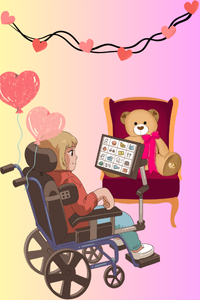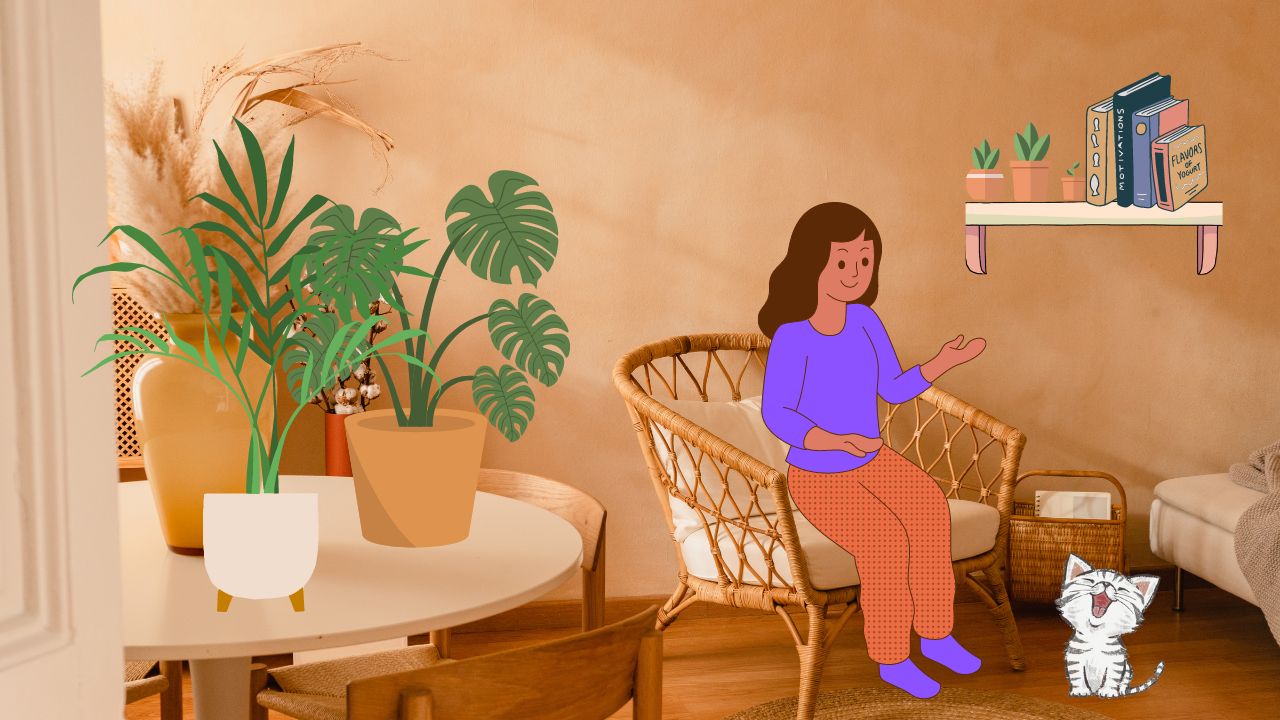Introduction
The Situation: Housebound with Chronic Illness or Disability
Life can throw us some unexpected curveballs, right? Quarantine, chronic illnesses, or disabilities can drastically change your daily life, limiting your ability to go out and do the things you love. Suddenly, you might spend much more time at home than anticipated and need housebound survival advice.
Importance of Taking Care of Mental Health During this Situation
Feeling isolated, bored, or anxious is easy when you’re housebound. That’s why it’s essential to maintain a positive attitude. Taking care of your mind is just as important as taking care of your body, and a little effort can make a huge difference in how you feel daily.
Tips and Tricks to Avoid Meltdown When Housebound
This blog is here to help! I’ve gathered some practical tips and tricks to make your time at home more enjoyable and less stressful. From creating a routine to staying connected with loved ones, we’ll explore various ways to engage your spirits and mind. So, grab a comfy seat, and let’s dive in together to make the most of your time at home!
Create a Routine
Creating a routine is one of the best ways to keep your sanity while being housebound. A daily structure can do wonders for your mental health, giving you a sense of purpose and normalcy.
The Importance of Routine for Avoiding a Meltdown
Routines are more than just a structured way to pass the time. They provide stability and predictability, which can reduce anxiety and stress. Knowing what to expect from your day makes everything feel more manageable. Plus, routines can help you stay productive and motivated, even when you’re at home all day.
However, the reality is that it is tough to stick to a routine with any kind of cognitive impairment. In this case, forgive yourself and get back on track as best you can. Here’s a simple daily routine to get you started:
Morning:
1. Wake up at a consistent time.
2. Do a short stretching or exercise routine.
3. Have breakfast and enjoy a cup of coffee or tea.
4. Spend some time planning your day or setting goals.
Midday
1. Work on a project or hobby.
2. Take breaks to stretch or walk around.
3. Have lunch and catch up on some light reading or a podcast.
Afternoon
1. Continue with your projects or hobbies.
2. Schedule a virtual chat with a friend or family member.
3. Take a short nap or do a relaxing activity like meditation
Evening
1. Prepare and enjoy dinner.
2. Wind down with a favourite TV show, book, or some music.
3. Do a calming bedtime routine, like taking a warm bath or journaling.
4. Go to bed at a consistent time.
Suggestions for Creating a Housebound Routine
Creating your own housebound routine can be fun and flexible. Here are some tips to help you build a schedule that works for you:
* Start Small: Start with just a few key daily activities and gradually add more as you get comfortable.
* Be Realistic. Set achievable goals, and don’t overload your day. Balancing productivity and relaxation is essential.
* Mix It Up: Include a variety of activities to keep things interesting. Combine tasks you need to do with things you enjoy.
* Stay Flexible: Life can be unpredictable, so it’s okay to adjust your routine as needed. The goal is to have a guide, not a strict schedule
.
* Listen to Yourself: Pay attention to how different activities make you feel. If something isn’t working, don’t be afraid to change it.
Remember, the key to a good routine is making it your own. Find what works best for you and stick with it – soon enough, you’ll feel more grounded and in control of your days.
Stay Active
Staying active is a game-changer when it comes to maintaining mental health while being housebound. Physical activity isn’t just good for your body; it’s a fantastic way to boost your mood and keep those blues at bay. It doesn’t have to be a wild cardio event; just enough movement to strengthen muscles and maintain flexibility.
Staying active is all about finding what works for you and making it a part of your everyday life. So, get moving, have fun with it, and enjoy the boost to your mood!
Importance of Physical Activity for Meltdown Avoidance
You might already know that exercise releases endorphins, the “feel-good” hormones that help reduce stress and anxiety. But it also gives you a sense of accomplishment and helps break up the monotony of staying indoors. Regular movement can improve sleep, increase energy levels, and even sharpen focus. It’s truly a win-win for your mind and body.
Simple Exercises That Can Be Done When Housebound
You don’t need a gym or fancy equipment to get moving, although a mat may be more comfortable. Here are some simple exercises you can do right at home:
Stretching
Start your day with gentle stretches to strengthen your muscles and improve flexibility.
Bodyweight Exercises
Think squats, lunges, push-ups, and planks. These exercises use your body weight for resistance and can be easily modified to suit your fitness level.
Yoga
Many online yoga classes are available for all skill levels. Yoga is great for both strength and relaxation.
Walking
If you have space, walking around your home or marching in place can increase your heart rate.
Dance
Put on your favourite music and have a mini dance party. It’s a fun way to get your body moving and lift your spirits.
Limit News and Social Media
In today’s digital age, constant news and social media updates can easily overwhelm people. While staying informed and connected is essential, too much exposure can negatively impact mental health.
Impact of Too Much News and Social Media on Emotions
Excessive news consumption, especially when it’s filled with negative stories, can lead to increased anxiety, stress, and feelings of helplessness. Similarly, spending too much time on social media can lead to comparisons, FOMO (fear of missing out), and even depression. It’s important to recognize these impacts and take steps to protect your mental well-being.

Suggestions
Here are some practical tips for managing your news and social media consumption:
Set Time Limits: Decide how much time you want to spend on news and social media each day. Use your phone’s built-in screen time settings or apps designed to track and limit usage.
Schedule Check-Ins: Instead of constantly checking the news or social media throughout the day, schedule specific times to catch up. This can help reduce anxiety and create a healthier routine.
Curate Your Feed: Follow accounts that bring joy, inspiration, and positivity. Unfollow or mute accounts that cause stress or negative emotions.
Take Breaks: Give yourself regular breaks from screens. Designate tech-free times, like during meals or before bed, to help you unwind and relax.
Focus on Reliable Sources: Limit your news consumption to a few trusted sources to avoid misinformation and unnecessary stress. Quality over quantity!
Practice Mindfulness: When you check the news or social media, remember how it makes you feel. If you notice it’s affecting your mood, it might be time to step back and take a break.
Engage in Other Activities: Fill your time with activities that bring you joy and relaxation. Whether reading a book, taking a walk, or engaging in a hobby, find alternatives to scrolling through your feeds.
Remember, it’s all about balance. Staying informed and connected is essential, as is taking care of your emotional well-being. Limiting your news and social media consumption can create a healthier, more positive daily routine.
Connect with Others
Staying connected with others is crucial for maintaining happiness levels while housebound. Human connection brings comfort, joy, and a sense of belonging, which are all important, especially when you spend so much time at home.
Importance of Social Connection for Mental Fitness
Social interactions are crucial for your emotional well-being. They can help reduce feelings of loneliness and isolation, provide support during tough times, and improve your overall mood. Even if you can’t be physically present with loved ones, staying in touch can make a huge difference in how you feel daily.
Virtual Ways to Connect with Friends and Family
Thanks to technology, there are plenty of ways to stay connected with friends and family without leaving your home. Here are some ideas:
Video Calls: Platforms like Zoom, Skype, or FaceTime make it easy to have face-to-face conversations. Schedule regular video chats to catch up and see each other’s smiles.
Social Media: Use Facebook, Instagram, or Twitter to share updates, photos, and messages. These platforms can help you feel more connected to your social circle.
Online Games: Play multiplayer games online with friends or family. It’s a fun way to interact and share some laughs.
Virtual Events: Attend virtual events together, like online concerts, webinars, or virtual tours of museums. It’s a great way to bond over shared interests.
Texting and Messaging Apps: Sometimes, a quick text or message can brighten your day. Use apps like WhatsApp or Messenger to stay in touch with loved ones throughout the day.
Suggestions for Staying Connected
Here are some additional tips to help you stay connected while housebound:
Schedule Regular Check-ins: Regularly check in with friends, family, or business associates. Whether it’s a weekly video call or a daily text, having a set schedule can help you stay consistent.
Join Online Communities: Look for online forums, social media groups, or virtual clubs that align with your interests. These communities can be a great way to meet new people and stay engaged.
Share Activities: Do activities together virtually, like cooking the same recipe, watching a movie simultaneously, or having a virtual book club. Sharing experiences can strengthen your connections.
Send Care Packages: Consider sending small care packages or handwritten letters. It’s a thoughtful way to show you care and maintain a personal touch.
Be Open and Honest: Don’t hesitate to share your feelings with your loved ones. Being open about your experiences can deepen your connections and provide mutual support.
Staying connected with others, even from a distance, can make a big difference in how you feel daily. So, reach out, keep in touch, and enjoy the warmth of human connection no matter where you are!
Explore New Hobbies
Trying new hobbies is a fantastic way to keep your mind engaged and lift your spirits while being housebound. It can bring excitement and a sense of accomplishment to your daily routine.

Importance of Trying New Things for Housebound Survival
Exploring new hobbies can significantly boost your mood. It provides a break from your routine and offers a sense of purpose and achievement. Learning something new keeps your mind active and can be a great way to discover hidden talents or passions. Plus, hobbies are a fun and productive way to spend your time, which can help reduce feelings of boredom and monotony.
Suggestions for Hobbies That Can Be Done at Home
Here are some great hobby ideas that you can quickly start from the comfort of your home:
Cooking and Baking: Experiment with new recipes, such as baking bread or making homemade treats. Cooking can be relaxing and rewarding, and you can enjoy delicious food!
Gardening: If you have space, start a small indoor garden with herbs, flowers, or vegetables. Gardening can be therapeutic and brings a bit of nature indoors. Just one pot plant is okay, too!
Crafting: Try DIY projects like knitting, crocheting, scrapbooking, or making jewellery. Crafting is a creative outlet that also results in beautiful, handmade items.
Reading: Dive into books you’ve always wanted to read. Join an online book club to share your thoughts and connect with others.
Art and Drawing: Whether it’s painting, sketching, or colouring, creating art can be incredibly soothing. You don’t have to be a pro to enjoy the process.
Puzzles and Games: Challenge your brain with puzzles, crosswords, Sudoku, or board games. These activities can be both fun and mentally stimulating.


More Housebound Hobbies
Music: Learn to play a musical instrument or improve your skills. There are plenty of online tutorials and resources to help you get started.
Writing: Start a journal, write stories, or try poetry. Writing can be a great way to express your thoughts and creativity. Try using stickers and colouring pens to keep it interesting.
Exercise and Dance: Explore different types of exercise or dance routines. From yoga to Zumba, there’s something for everyone to enjoy while staying active.
Learning a New Language: Learn a new language using apps, online courses, or language exchange programs. It’s a rewarding challenge that can open up new cultural experiences.
Trying new hobbies can be a delightful way to make the most of your time at home. Pick something that interests you, give it a go, and most importantly, have fun. You might just find a new passion that brings you joy and satisfaction!
Create a list of all the things you used to wish you could do if you were home more often
Being housebound offers a unique opportunity to explore personal interests and tackle projects you’ve always wanted to do but have not had the time for. It’s a chance to turn those “I wish I could…” thoughts into reality.
Importance of Exploring Personal Interests and Desires
Taking the time to explore your personal interests and desires is essential for personal development. It can bring joy and fulfilment, helping you make the most out of your time at home. Reflecting on what you genuinely enjoy and have always wanted to try can lead to discovering new passions and hobbies.
Write a List of Home Projects and Prioritize the Ones That Can Be Done Now
Start by writing down all the projects and activities you want to do. Whether organizing your closet, starting a garden, or learning to cook a new cuisine, put it all on paper. Once you have your list, prioritize the projects that can be done with your current home resources and abilities. This helps you focus on what’s achievable and keeps you from feeling overwhelmed.
Suggestions for Small Creative DIY Projects That Can Be Done at Home when housebound
Here are some fun and creative DIY projects you can tackle right at home:
Organize Your Space: Declutter and reorganize your closet, pantry, or home office. Creating a tidy space can make you feel more relaxed and productive.
Decorate: Create new décor items like handmade picture frames, wall art, or personalized cushions. Small touches can refresh your living space.
Upcycle: Repurpose old furniture or clothing into something new. For example, turn an old t-shirt into a reusable tote bag or give an old chair a fresh coat of paint.
Homemade Beauty Products: Make soaps, candles, or body scrubs using natural ingredients. It’s a great way to pamper yourself and get creative.
Photo Albums: Organize your digital photos and create printed photo albums or scrapbooks. It’s a nostalgic and rewarding project.
Craft Projects: Make jewellery, knit a scarf, or create handmade greeting cards. Crafting can be both relaxing and satisfying.
Benefits of Completing Projects
No matter how small, completing projects brings a beautiful sense of accomplishment. It can boost your self-esteem and provide a tangible reminder of your productivity. Plus, engaging in projects helps keep your mind active and can relieve stress. By focusing on things you enjoy and working towards a goal, you can make your time at home both fulfilling and enjoyable.
So, grab a pen and paper, start jotting down your ideas, and get ready to dive into some exciting projects. Who knows? You might discover a new hobby or talent that you absolutely love!
Take Care of Your Body
Taking care of your body is paramount for maintaining your overall well-being, especially when spending extensive time at home. It’s about treating yourself with kindness and ensuring you feel good inside and out.
Importance of Self-Care for Mental Health When you’re Housebound
Self-care isn’t just about pampering yourself (though that’s a part of it!). It’s about recognizing your needs and taking intentional steps to nurture your physical and emotional health. When you prioritize self-care, you’re better equipped to handle stress, maintain a positive outlook, and improve your overall quality of life.
Suggestions for Self-Care Activities
Here are some simple self-care activities you can incorporate into your daily routine:
Take Time to Unwind: Set aside daily moments to relax and recharge. Whether reading a book, taking a bath, or practising deep breathing exercises, find activities that help you unwind.
Practice Mindfulness: Engage in activities that promote mindfulness, such as meditation, yoga, or simply taking a mindful walk. These practices can help reduce stress and increase your sense of calm.
Stay Hydrated: Drink plenty of water throughout the day to keep your body hydrated and functioning optimally.
Healthy Eating: Nourish your body with nutritious meals and snacks. Focus on incorporating fruits, vegetables, whole grains, and lean proteins into your diet.
Limit Caffeine and Alcohol: Be mindful of your caffeine and alcohol intake, as excessive consumption can impact your sleep and overall well-being.
Stay Active: Incorporate regular physical activity into your routine, whether stretching, doing yoga, or going for a walk. Movement is good for your body and boosts your mood.
Pamper Yourself: Treat yourself to small indulgences like a DIY spa day, painting your nails, or using your favourite skincare products.
Get Enough Sleep: Prioritize quality sleep by establishing a bedtime routine, creating a comfortable sleep environment, and aiming for 7-9 hours of sleep per night.
Importance of Proper Sleep and Nutrition
Sleep and nutrition play critical roles in our overall health. Adequate sleep helps regulate mood, improve cognitive function, and support the immune system. Similarly, maintaining a balanced diet gives your body essential nutrients and energy. It supports the optimal functioning of your organs and systems.
You invest in your long-term health and happiness through self-care activities, healthy eating, and quality sleep. Self-care isn’t selfish—it’s essential for living and being your best self. So, treat yourself with compassion and make self-care a priority every day!
Practice Mindfulness and Gratitude
Mindfulness and gratitude can be powerful tools for enhancing your well-being, especially when housebound. These practices help you stay grounded, appreciate the present moment, and foster a positive mindset.
What is Mindfulness and Gratitude?
Mindfulness involves being fully present in the moment without judgment. It’s about paying attention to your thoughts, feelings, and surroundings with awareness and acceptance.
On the other hand, gratitude is acknowledging and appreciating the positive aspects of your life, no matter how big or small.
Importance of Mindfulness for Mental Health
Mindfulness has been shown to reduce stress, anxiety, and depression. Practising mindfulness can improve your ability to manage difficult emotions, increase resilience to challenges, and enhance overall mental well-being. It helps cultivate a greater sense of calm, clarity, and self-awareness.
Practising mindfulness and gratitude regularly can cultivate a greater sense of peace, positivity, and resilience in your daily life. These simple yet transformative practices help you navigate challenges more efficiently and embrace moments of joy and gratitude. So, take a deep breath, embrace the present moment, and let mindfulness and gratitude enrich your housebound journey.
Seek Professional Help
If you find being housebound incredibly challenging, seeking professional help is a courageous step. It’s important to recognize when you need additional support and contact trained professionals who can provide guidance and assistance.
When to Seek Professional Help
You might consider seeking professional help if:
* You’re feeling overwhelmed, anxious, or depressed regularly.
* Your usual coping strategies are equal to what they used to be.
* You’re experiencing significant changes in your mood, behaviour, or thoughts.
* Your relationships, work, or daily activities are being affected by your emotional state.
* You’re having difficulty functioning or taking care of yourself.
Remember, it’s okay to ask for help when you need it. Seeking professional support can empower you to better understand your feelings and develop effective management strategies.
Types of Professionals
There are various types of professionals who specialize in mental health and can provide support tailored to your needs:
Psychologists: Trained in assessing and treating mental health conditions using psychotherapy (talk therapy). They can help you understand your thoughts, emotions, and behaviours.
Psychiatrists: Medical doctors who specialize in diagnosing and treating mental health disorders. They can prescribe medication and provide psychotherapy.
Licensed Counsellors or Therapists: These professionals offer counselling and therapy to help you navigate challenges, improve coping skills, and achieve personal goals.
Social Workers: They provide counselling and support services, often focusing on social and environmental factors affecting mental health.
Online Resources for Professional Help
If you’re housebound or prefer remote support, there are many online resources available:
Teletherapy Platforms: Websites and apps that connect you with licensed therapists for virtual sessions.
Online Counselling Services: Organizations that offer confidential counselling via phone, chat, or video calls.
Mental Health Apps: Mobile applications that provide self-help tools, guided meditations, and access to mental health professionals.
Support Groups: Online communities or forums where you can connect with others facing similar challenges and receive peer support.
When seeking professional help online, ensure that the platform or service is reputable, protects your privacy, and adheres to ethical standards.
Remember, reaching out for professional help is a positive and proactive step toward prioritizing your mental health. You deserve support and guidance to help you feel better and navigate life’s challenges with resilience. So, don’t hesitate to explore your options and find the support that’s right for you.
Conclusion
Hey there, you’ve made it through the entire blog! We’ve covered a lot of ground on how to stay sane during housebound situations like quarantine, chronic illness, or disability. Let’s recap some of the critical tips and tricks we’ve discussed to help you thrive while stuck at home.
Taking care of your mental health is as important as your physical health. It’s okay to prioritize your well-being and seek support when needed. Remember, you deserve to feel good and thrive, even when circumstances keep you at home.
Embrace the tips and strategies that resonate with you. Feel free to experiment with different approaches to find the best for you.
Final thoughts on Housebound Survival
As you navigate a housebound life, be gentle with yourself and practice patience. It’s normal to have ups and downs, and asking for help when needed is okay.
Stay connected with loved ones, nurture your passions, and prioritize activities that bring you joy and fulfilment. By taking proactive steps to guard your sanity, you’re investing in a happier and more resilient you.
Thank you for joining me on this journey to explore ways to stay sane and thrive during housebound times. Remember, you’re stronger than you know, and you have the power to create a positive and fulfilling experience, no matter where you are. Take care, stay well, and keep shining bright!



